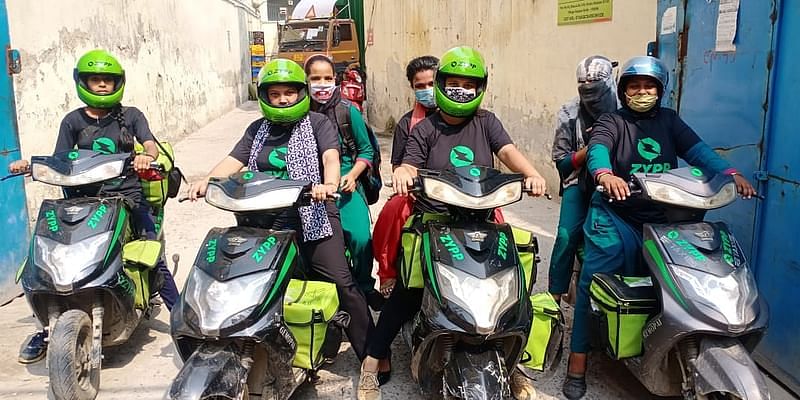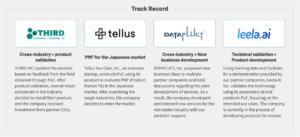Last-mile delivery is a big business in India. According to KPMG, there will be 6.1 million delivery executives in India by 2025 making last-mile deliveries.
However, a majority of last-mile deliveries are completed using internal combustion engine vehicles. But electric mobility is making significant inroads in the sector.
One such startup is Zypp Electric, which is on a mission to make all last-mile deliveries electric. Headquartered in Gurgugram, the startup was founded by husband and wife duo Akash and Rashi Agarwal in 2017.
“We, at , aim to make India carbon-free by transforming the last-mile deliveries from ICE (Internal Combustion Engine) to electric vehicles, making them more affordable and eco-friendlier with our expertise in EV technology and tech-enabled operations on the ground,” Akash Gupta, Co-founder and CEO, Zypp Electric tells YS.
Zypp Electric fleet
The early days
Akash is an alumnus of the Institute of Management Technology in Ghaziabad and has worked for the likes of Airtel, Snapdeal, and Mobikwik. Rashi graduated from IIPM in 2007 and has worked for the likes of ICICI Bank and S&PCapitalQ.
The startup had begun as an electric rental mobility company for commuters. The founders observed that 50 percent of the commute in India is less than 5 km. In 2019, the founders saw that last-mile delivery was rapidly growing at 30 percent YoY, especially in ecommerce and e-grocery segments.
“So, we decided to tap into this last-mile delivery market and help it transition into an EV-led delivery ecosystem,” Akash adds.
While several startups such as Bounce, Vogo, Yulu, and Rapido are solving last-mile mobility, the founders of Zypp saw a similar rush of opportunity with companies in the B2B segment wanting to go electric to fit the sustainability demands of India.
Akash Gupta and Rashi Agarwal, Founders of Zypp Electric
The solution
“We serve businesses of all sizes, right from large ecommerce companies to e-grocery to kirana stores and restaurants. We handle their end-to-end last-mile deliveries – from stores to customers’ homes with various differentiated tech-enabled custom solutions, such as using e-vehicle, fixing the timings of services, IoT-enabled battery swapping infrastructure, ensuring good riders, and giving an exclusive experience to their end customers,” says Akash.
All Zypp electric vehicles are enabled with IoT technology to track the vehicles and delivery executives in real-time. The tech tracks batteries that can be replaced at Zypp swapping stations which are installed at key touch-points.
The startup also monitors vehicle utilisation to maximise efficiency. In short, the founders believe that “moving vehicles make money, standing ones don’t.”
Businesses interested in Zypp Hyperlocal service can also list their stores on Zypp Merchant Panel to get more business through Zypp dedicated riders who handle all their deliveries.
“With Zypp delivery, orders get delivered to the customers’ doorstep. To increase traction and boost sales for the business, Zypp provides free marketing promotions with attractive offers to B2B businesses,” says Akash.
For businesses to have their own delivery persons can stack up costs – from taking care of bikes, the rider, the fuel expense, and their absenteeism. Zypp offers businesses an electric fleet, and gives them trained riders, customised pricing with technology, and API integration.
The startup had a lot of challenges to solve, such as partnering with the right OEMs, getting the right batteries on board, setting up necessary swapping stations for the infrastructure layer, and leasing EVs.
Zypp solves for growth in the ‘home delivery’ market, including hyperlocal offline stores. To execute this, Zypp onboards their own their riders, use tech (AI, IoT, computer vision), and cross-utilise them throughout the day.
Business model
ZYPP works on a B2B last-mile delivery model. It has partnered with a host of ecommerce, e-grocery, and hyperlocal businesses for deliveries.
Zomato was their first business client and began to help all their delivery executives who wanted to go electric.
“After a few months, big clients like Amazon and BigBasket came forward and wanted to embrace EVs as well. This posed a new challenge as they didn’t just need the vehicle, they wanted the delivery executive as well. That’s when we started onboarding our trained pilots, and today, we have more than 300 B2B customers including the largest ecommerce, largest food delivery, largest e-grocery, bike taxi and offline chains, and hundreds of dark-stores working with Zypp, with over 1,000 Zypp pilots delivering good and essentials,” says Akash.
Some of Zypp’s notable clients include Amazon, Big Basket, Grofers, Spencers, Rapido, Flipkart, Myntra, Modern Bazaar, Easyday and many more, along with over 300 small local small stores and businesses.
“We have an annual revenue run rate of over $1 million right now – this is a 6x jump in revenues versus our revenues last year. We’re delivering 200,000 shipments a month as of now and have been growing 20 percent month on month for the last six months on average,” he adds.
Zypp is the last-mile delivery service provider for three main kinds of customers: pan-India ecommerce, hyperlocal offline stores, and bike taxis. It operates on mixed revenue models: dedicated riders (fixed monthly revenue), pay-per-delivery with minimum commitment, and on-demand pay-per-use.
“The add-on to the above core is the use of EVs. This gives Zypp greater margins due to the lower cost of operation of the vehicle as well as fully connected vehicles, thanks to BMS/IoT. It is also getting us inroads into large customers due to the pull factor of EV fleets,” says Akash.
The startup also manages the leasing of the vehicles (for the model to remain asset-light) as well as provide battery-swapping facilities and charging points at convenient locations.
The founders have invested Rs 1.5 crore in the company.
The company raised its pre-Series A funding of $2 million (Rs 14 crore) from IAN Fund in late 2019. Prior to that, the founders had a raised seed and angel rounds of Rs 3 crore from a clutch of angels and with Venture Catalysts. Also, angels and individual investors have invested in over 1,000+ EVs for them, amounting to another funding of Rs 6 crore in the form of assets by people.
The company is now looking to raise its Series A round to expand its footprint.
The road ahead
Zypp is already live in five cities (Delhi, Mumbai, Bengaluru, Hyderabad, and Chennai).
Over the next 18 months, it is all set to expand its EV fleets from 1,000 to 10,000 vehicles, of which, the company is aiming at least 15 percent to be women-led, and to cover 10 major cities in India.
As of today, it has 300 clients and is aiming to cross 1,000-plus partners within FY22.
“We have grown at a tremendous rate of 8X from the time IAN Fund had invested. We are planning to expand to different Tier-II cities too, which are seeing a rise in demand for ecommerce and e-grocery,” says Akash.
“We’re looking to be at Rs 300 crore annual revenue run rate by March 2022, with 15,000 Zypp Electric EVs running across 12 cities in India,” he adds.
Now, Zypp is exploring how the rider can be facilitated in owning or renting the EV themselves, as well as facilitating more charging points with the growing EV ecosystem.










